C.E. Murphy
Books: Fantasy | Romance
Negotiator: Heart of Stone (2007), House of Cards (2008), Hands of Flame (2008)
Walker Papers: Urban Shaman (2005)
Austen Chronicles: Magic and Manners (2016)
Lovelorn Lads: Bewitching Benedict (2017)
Winter Moon (2005), Running with the Pack (2010)
Heart of Stone (2007)
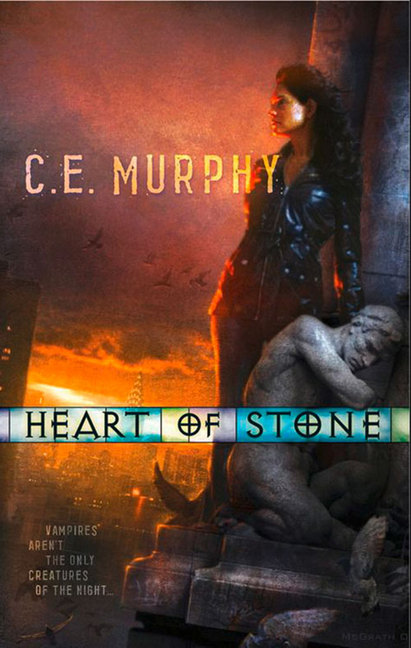 I inadvertently picked up the second book in this series, so being me, I had to go back and find the first book in the series, and by then I'd gotten sucked into the Repairman Jack series and the Commissario Guido Brunetti mysteries, and pretty much forgot about this series. But after taking a break from those two series I found this and decided it was time to check it out.
I inadvertently picked up the second book in this series, so being me, I had to go back and find the first book in the series, and by then I'd gotten sucked into the Repairman Jack series and the Commissario Guido Brunetti mysteries, and pretty much forgot about this series. But after taking a break from those two series I found this and decided it was time to check it out.
Margrit Knight is a lawyer for Legal Aid, her on-again off-again boyfriend is a cop, and when she speaks to a man wanted for murder, her life gets very complicated, very quickly.
I liked Margrit a lot. She does stupid things, but her heart is in the right place, which is how a rich girl ends up working at Legal Aid I suppose. I also like he she recognizes that she can't necessarily reconcile the contradictions in her life–especially how race affects her job and her personal life.
I also really liked how the supernatural element was done in these books. I won't say more, because I really don't want to give away any part of the series. I'll simply say things didn't go the way I expected, and that was a nice change. (Don't read the back! It gives too much away! I didn't read the back until after I read the book and I'm glad!)
Although there is kissing and there are threats of boinking, no boinking actually occurs, which was another nice change of pace for a supernatural fantasy. Though there is a fair amount of yearning.
The mystery surrounding the murders and the character she meets through the course of the book was also good, although there wasn't much of a chance of being able to guess "whodunnit". But that's fine with me.
So Heart of Stone is an interesting supernatural fantasy. I enjoyed the main character, although I think she could have had one or two more weaknesses, and been less enamored of Alban, but all in all I enjoyed the book, and recommend it without reservations.
Rating: 7/10
House of Cards (2008)
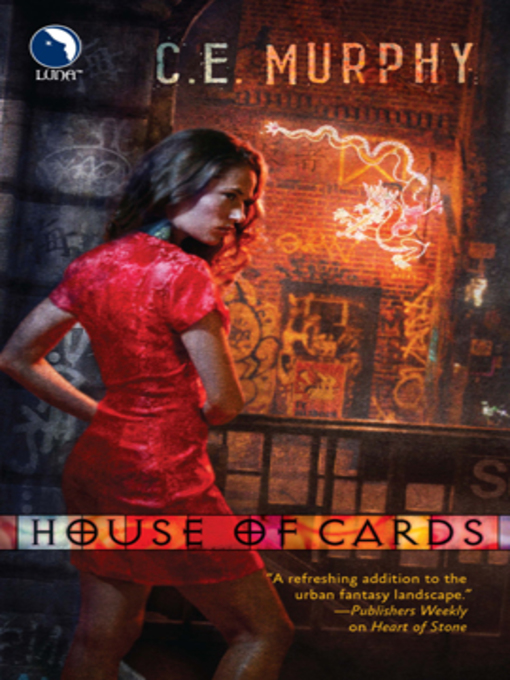 Book two in the Negotiator series, House of Cards, continues the story of Margrit Knight, who has stumbled upon the existence of the Old Races: gargoyles, djinn, dragons, selkie, and vampires remain hidden in the world, although their numbers are diminished.
Book two in the Negotiator series, House of Cards, continues the story of Margrit Knight, who has stumbled upon the existence of the Old Races: gargoyles, djinn, dragons, selkie, and vampires remain hidden in the world, although their numbers are diminished.
I enjoyed this book as much as I did Heart of Stone. It had it strengths and weaknesses, but for the most part was a fun read.
The strengths continued to be the variety of characters, and their complex histories and backgrounds. The major weakness was that Margrit was the only major female character in the story, and at one point all the male characters seemed to be swooning over her. Although they weren't precisely swooning, I was a little annoyed by her being to only female surrounded by males.
Also? This bugged me:
"I thought you said the gargoyles were the only Old Races to have ever been enslaved." Her voice came from a far distance, as if disbelief or weariness had made an unbreachable wall around her.
"I didn't know. Alban slipped his arms around her, offering strength and support. Margrit groaned and urned against him, feeling distance melt away into comfort. "Perhaps it's somewhere in the memories, buried in mountain roots. I've never studied the djinn that closely."
Oh please! Folklore is full of stories of djinn–and even selkie–being enslaved or taken captive by humans. Especially djinn. Those two paragraphs struck me as so unbelievably false I was thrown completely out of the story and had to fume for several minutes.
But otherwise the story was solid and a nice fast read. There was boinking, which I wasn't thrilled about. But at least things were clear with Margrit and who she was interested in and why. And I have to admit that although she is surrounded by men, it is clear who she is interested it, and although Janx flirts with her, he clearly isn't interested in her. So it's not like everyone is swooning over her. It just would have been nice to have other women to play off Margrit. (Yes, she did spent some time with her roommates and her mother. But it wasn't the same.)
So, fun. Nothing great, but I'll be reading the next book.
Rating: 7/10
Hands of Flame (2008)
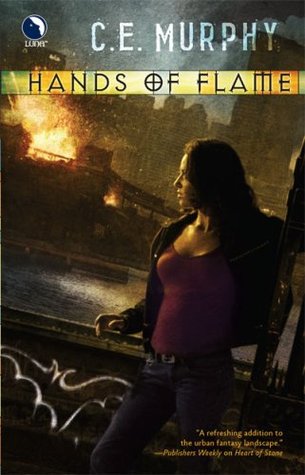 The third and (for now) final story in the Negotiator story arc finds Margrit dealing with a conflict between the Old Races that is turning into an out-and-out war.
The third and (for now) final story in the Negotiator story arc finds Margrit dealing with a conflict between the Old Races that is turning into an out-and-out war.
A war that Margrit inadvertently started.
Although I was quickly sucked into the story, and tore through the book to find out what happened, my opinion about the book is conflicted.
On the positive side, the pace is fast and I was drawn right into the story, reading it in two days, despite the need to go to work. I also liked the resolution of the story arc. Sure there are more stories that could be written, but there is a nice sense of resolution here.
On the down side, I still don't get what Margrit sees in Alban. I know she thinks he's wonderful, but I found Janx far more interesting. And twice in the story I know precisely where things were going, which made getting there a lot less interesting. It's hard to build up suspense if it's pretty obvious what is going to happen, and that was probably the books biggest failing.
SPOILER
If you want me to believe that a character is dead, first and foremost, don't tell the death from first person point of view. That's a dead giveaway (pardon the pun). Secondly, I'm not going to believe the main character in a story is dead if I still have a quarter of the book left to read.So not only did I know she wasn't dead because of the first person narrative, there wasn't another character strong enough to carry the remainder of the book. So I mostly just wanted her to get on with her dramatic death and get hurry up and come back to life so we could GET ON with the rest of the story.
END SPOILER
So I was pleased with the resolution of the story arc, and I enjoyed spending time with most of the characters, but some parts of the story drug on a little. And I still just don't get what she sees in Alban. If you haven't read the first book, don't pick up this one. Start in the first book in the series and read through in order. Although in theory the books could stand alone, I don't think they'd do so very well.
Rating: 7/10
Urban Shaman (2005)
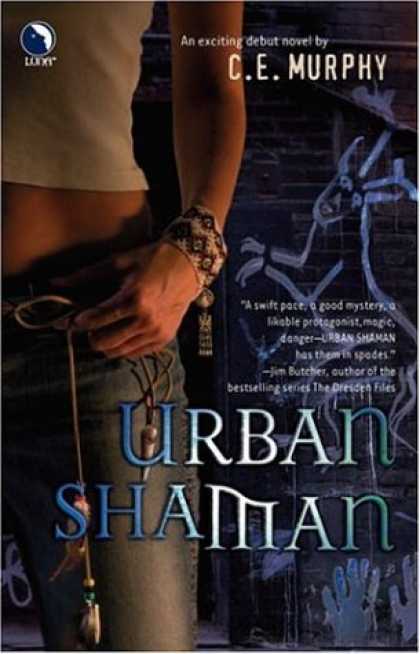 Joanne Walker (named by her mother Siobhan Walkingstick) is returning to the states from her mother's funeral–a woman she never knew until the end of her life, and even then she never truly knew her mother.
Joanne Walker (named by her mother Siobhan Walkingstick) is returning to the states from her mother's funeral–a woman she never knew until the end of her life, and even then she never truly knew her mother.
"(S)o Mother just called up one day and said she was dying and she'd like to meet me before she keeled over. I was furious. I mean, who was she to ignore me my whole life and then turn around and pull something like that?"
"Your mother?" Gary offered.
I sighed and nodded. "That was basically what I came up with, too."
She's returning after a long absence from her job, fully expecting to be fired when she gets back to the precinct. Her boss–a dyed in the wool cop, doesn't like her, even though as the precinct mechanic, she's certainly no threat to his job.
As the plan bringing her home is coming in for a landing, Joanne sees a woman being chased. No one believes her, so she hails a cab and sets out to see if she can find and rescue the woman herself.
There was plenty to enjoy about this story, especially Joanne's wit.
"God damn it," I said, "that was a new bra."
Gary laughed again, and I looked up long enough to glare at him.
"Sure, laugh. It cost sixty bucks. God-damned men don't have to buy goddamned expensive underwear…."
Because, yeah. Women's underwear IS expensive. Ridiculously so if you want something that fits and is comfortable AND does its job.
I also really loved Gary, and was delighted that he stuck around. What I was less enamored of was the "sexual tension" between Joanne and her boss, Morrison. Yeah, it's published by Luna, so it has to have romantic elements, but it all just felt unnecessary.
I liked and enjoyed the story, but there were some things I had problems with: primarily, the way that everyone seemed to readily accept what was happening. I just had a hard time believing people would be so accepting.
With most supernatural fantasy, the supernatural elements are either already out in the open, or else they are hidden and attempting to remain hidden. This story did neither, instead bringing the supernatural out but having people readily accept it.
I just have a hard time believing things would work out that way. I think that Carrie Vaughn was closer to the reality with her Kitty Norville story, where the supernatural is snatched up by the government and studied. Video proof of the supernatural? I just don't see how that wouldn't have brought a huge amount of (extremely unwelcome) attention to everyone involved.
Mostly, I just kept waiting for the government to come in and snatch everyone up and take them away to their laboratories.
Aside from that, I very much enjoyed the story.
Published by Luna
Rating: 7/10
Reread: July 2014 | Rating: 6.5/10
Magic and Manners (2016)
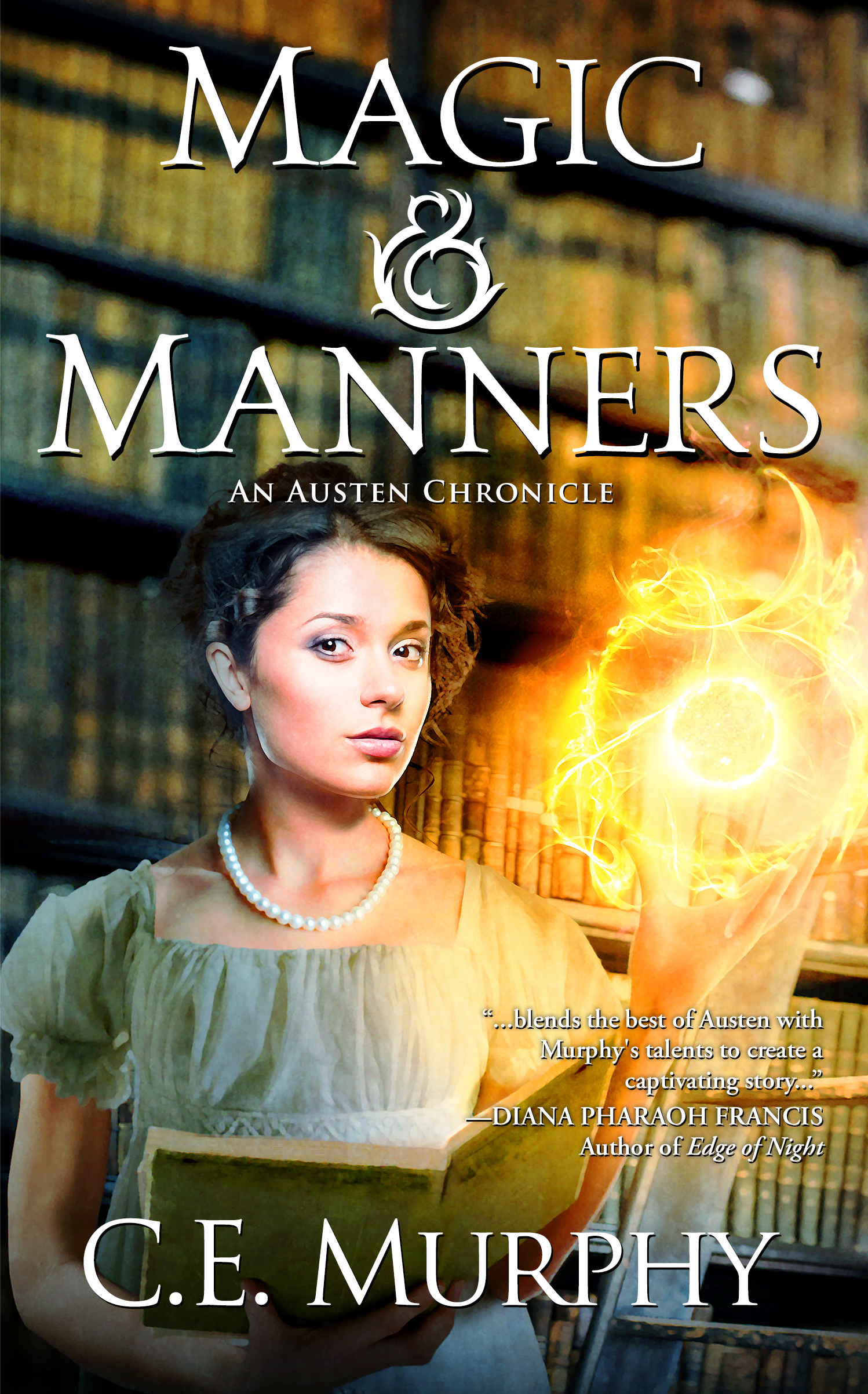 Set in alternate Regency England, with magic.
Set in alternate Regency England, with magic.
First, I really liked the magic and world-building. Magic is stigmatized in England, worked only by the lower-classes who are useful to the crown in warfare.
The new Mrs Dover marked no complaints about a home where the tea remained mysteriously hot even after standing unattended for hours, or where a warm breeze seemed to waft from the kitchen's roaring fires into all the coldest places in the halls. The laundry dried remarkably quickly, and stains never set in tablecloths; these were the unrealised advantages to marrying a man rumoured to have magic of his own. Mr Dover had more money than Mr Hampshire; perhaps it was the greater income which allowed grass to grow more greenly or the dogs to be particularly well mannered and disinclined to shedding.
And in this world, magic kept Europe from conquering the New World, so instead of the (eventual) United States, we have the League of Iroquois with Europeans barely tolerated. And there are African Kingdoms whose descendants are treated as equals in England.
Second, I love that regardless of how much I despised Fitzgerald Archer upon first meeting him, his change of heart and behavior eventually put me firmly in his camp–and these changes were not easy, but a struggle for both Archer and Elsabeth.
Archer sat stiffly, ate little, spoke not at all unless directly addressed, and then only answered as briefly as possible. Was the lamb tender enough? It was. Had he been bothered by the spot of rain that fell earlier? He had not. Were the vegetables to his liking? They were. Did he enjoy the previous Season in London? No.
Elsabeth Dover and her four sisters (Charlotte, Ruth, Matilda (Tildy), and Dina (Leopoldina) are afflicted with magic from their father, and the accidental display by the two eldest as young girls sent the family from London to country where the girls could (hopefully) escape the stigma.
(I)t was Mr Dover's private opinion that Ruth would not find a man dour enough to suit her, much less be suited by her, and that any man fool enough to marry Leopoldina or Matilda was not a man he wished to pay a dowry to.
Mr Webber has brought his family and his friend Mr Archer to spend the summer in the country, and once Mrs Dover learns of eligible bachelors in the area, she can do nothing by plan ways to marry off her daughters.
But of course other mothers in the area are thinking the same thing.
"My mamma," Sophia said with great and precise restraint, "sometimes mistakes the pursuit of my welfare for kindness, when to someone else it might be a terrible cruelty."
I really really love how the various characters grew over the course of the story.
"(O)f course I can do nothing less than lend my God-given strength to their health and happiness."
"God-given, is it, Ruth?"
"We are made in His image, and He does not make mistakes, nor burden us with gifts or faults we cannot bear."
That is a lovely and delightful sentiment.
"We do not forgive people because they are worthy, Papa. We forgive them because we love them, and because it gives us peace within ourselves to do so."
As is that.
I really, thoroughly enjoyed this–despite never having bothered to have read Pride and Prejudice.
Published by Miz Kit Productions
November 2016 | Rating: 9/10
Bewitching Benedict (2017)
 I really enjoyed CE Murphy's Magic and Manners, so when I saw she had a straight-up historical romance, I put it on my wish list, and then got a surprise when Tania got it for me.
I really enjoyed CE Murphy's Magic and Manners, so when I saw she had a straight-up historical romance, I put it on my wish list, and then got a surprise when Tania got it for me.
Set in the late 1700s (Many of the male characters fought in the Napoleonic wars)
Charles had returned from the Peninsular War some weeks ago only to be accosted by his parents' hopes of a swift and suitable marriage, a barrage as ceaseless as the guns of war. He consequently spent as many waking hours as possible in the Lads' company, avoiding not only his mother's unsubtle hints but what few parties and socials that nice society held in the autumn.
This was a very interesting story that kept me guessing the entire time–in fact I kept reading even when I needed to go to sleep, because I was certain the end was coming soon. (It wasn't)
Claire Dalton is a country Miss, ready for her first season, who is excited when her cousin visits, bringing with him two of his friends. However, both friends inadvertently insult her, leading to the tension between the romantic leads.
"With all due respect to my cousin, if your gentlemen friends are all so poorly raised that exposure to them causes you to forget your manners, perhaps you should consider finding new friends."
Benedict Fairburn has been best friends with Charles Dalton since their school days–one of Charles' "Lads" with whom Charles has surrounded himself. When he is told that his great-aunt will leave her fortune to an orphanage if he doesn't marry before she does, he immediately goes on the marriage mart–whether he wants to or not.
Although Claire and Benedict are the main characters in this story, it was as much about Charles' Lads and all the other characters as it was about Claire and Benedict. And I'll be honest, I wasn't rooting for Benedict. With good reason.
I do not wish a husband with only the makings of a gentleman. He must already be one. A woman's job is to raise her children, not her husband; that is his mother's duty.
But instead wanted Claire to marry Jack Graham, the competing male lead, who I liked much much more than Benedict. All of which made the story that much more compelling and interesting, because Jack had A Secret, and was also in love with someone else.
And I find it difficult to say much more without giving away all the complicated bits. Suffice to say that I really enjoyed this story, and was extremely concerned as to how things were going to work out for everyone, and was prepared to be very offended if Jack was left in the lurch. (He wasn't. This is a romance after all.)
But really the strength of the story was the secondary characters, who I very much liked, and very much want to learn more about. (Good job there CE Murphy.)
Publisher: Miz Kit Productions
- March 2018 | Rating: 8/10
Reread: October 2022 | Rating: 7/10
Winter Moon (2005) Mercedes Lackey, Tanith Lee, and C.E. Murphy
 Winter Moon contains three novellas all centered around the moon: Moontide by Mercedes Lackey, The Heart of the Moon by Tanith Lee, and Banshee Cries by C.E. Murphy. Moontide and Heart of the Moon are traditional fantasies, while Banshee Cries is an urban fantasy set in the modern world where magic--or power--is just out of the sight of most people.
Winter Moon contains three novellas all centered around the moon: Moontide by Mercedes Lackey, The Heart of the Moon by Tanith Lee, and Banshee Cries by C.E. Murphy. Moontide and Heart of the Moon are traditional fantasies, while Banshee Cries is an urban fantasy set in the modern world where magic--or power--is just out of the sight of most people.
Mercedes Lackey's Moontide tells the story of Moira, whose father sent her away to Countess Venerable to be finished because he had no interest in dealing with her himself. But now she has been recalled to her fathers keep, and so she must determine why she has been called back, and whether her father is involved in treachery.
It's been several years since I've read a Mercedes Lackey book, and somehow I had managed to forget how much I enjoy her writing. What I particularly liked about this story was the way that the keep became a character in the story. The stone building is as integral to the story as Moira. But most important is Moira. Although she has some power, as a female she is very much at the mercy of her father, and must use cunning and wit to circumvent him. Like other books in the Luna line, this is a romance, except that the fantasy is primary and the romance is secondary. And it isn't a kissing story.
In Tanith Lee's The Heart of the Moon, Clirando has been betrayed by her lover and the woman she considers her sister. Her reaction to the events--and the result of those events--cause her to be sent to the Moon Isle for the Seven Nights.
I initially didn't care much for this story. I hate the main characters name--I kept reading Cilantro--and I just didn't care much about her. But eventually the story drew me, and although I never developed much of a liking for Clirando, I did like the characters she met, and her adventures were intriguing. And although this was supposed to be a romance, the romance portion of the story was a problem for me. I just didn't buy that this bitter woman could so easily fall in love. But the fantasy part of the story was interesting enough that I could ignore the mushy bits.
Although C.E. Murphy's Banshee Cries continues the story of Jo Walker, I was easily able to slip into the tale and into the world, despite having not read the previous tale. I liked Jo Walker, although I initially found her resistance to her powers confusing (it became more clear as the story progressed, and I would think that having read the first book would have made it more clear.) And this didn't detract from my enjoyment of the story.
The only thing I find it important to mention is that these three stories are quite different. They are a good overview of the scope of the Luna line, but the thing holding this collection of novellas together is the theme of the winter moon. Not a similarity in theme or style.
If you have not read a Luna book before, I would highly recommend Winter Moon. This stories in this book are a good overview of the variety in the Luna line, and although not everyone will enjoy all three stories, there is such a variety in these stories that most readers should find something here to enjoy.
Rating: 7/10
Running with the Pack (2010) edited by Ekaterina Sedia
 When I saw there was a new werewolf anthology edited by Ekatrerina Sedia with a story by Carrie Vaughn I automatically ordered it. Then of course, once it arrived, it sat around like anthologies tend to do, waiting for the "right" time to read it. But eventually read it I did, and it was excellent, with a few caveats, the biggest being, the anthology should not have ended on the story it did. On the plus side (and this is huge plus in my opinion) these are stories that deal with werewolves without all the hawt supernatural sex. A couple stories acknowledge sex, but the focus of these stories is upon the other aspects of being a werewolf, which I very much enjoyed, because there is a lot to explore in this mythos and this anthology does a very good job of moving beyond the paranormal romance aspect of werewolves.
When I saw there was a new werewolf anthology edited by Ekatrerina Sedia with a story by Carrie Vaughn I automatically ordered it. Then of course, once it arrived, it sat around like anthologies tend to do, waiting for the "right" time to read it. But eventually read it I did, and it was excellent, with a few caveats, the biggest being, the anthology should not have ended on the story it did. On the plus side (and this is huge plus in my opinion) these are stories that deal with werewolves without all the hawt supernatural sex. A couple stories acknowledge sex, but the focus of these stories is upon the other aspects of being a werewolf, which I very much enjoyed, because there is a lot to explore in this mythos and this anthology does a very good job of moving beyond the paranormal romance aspect of werewolves.
- Wild Ride by Carrie Vaughn
- Side-Effects May Include by Steve Duffy
- Comparison Of Efficacy Rates For Seven Antipathetics As Employed Against Lycanthropes by Marie Brennan
- The Beautiful Gelreesh by Jeffrey Ford
- Skin In The Game by Samantha Henderson
- Blended by C.E. Murphy
- Locked Doors by Stephanie Burgis
- Werelove by Laura Anne Gilman
- In Sheep's Clothing by Molly Tanzer
- Royal Bloodlines by Mike Resnick
- The Dire Wolf by Genevieve Valentine
- Take Back The Night by Lawrence Schimel
- Mongrel by Maria Snyder
- Deadfall by Karen Everson
- Red Riding Hood's Child by N.K. Jemisin
- Are You A Vampire Or A Goblin? by Geoffrey Goodwin
- The Pack And The Pickup Artist by Mike Brotherton
- The Garden, The Moon, The Wall by Amanda Downum
- Blamed For Trying To Live by Jesse Bullington
- The Barony At Rodal by Peter Bell
- Inside Out by Erzbet Yellowboy
- Gestella by Susan Palwick
C.E. Murphy‘s story Blended, like a couple others in the series, discards the idea that werewolves are immortal (or at least very long lived) and instead gives them a wolf span of years as opposed to a human span of years–which puts an interesting twist on things.
All in all, this is an excellent anthology, and one I can highly recommend.
Published by Prime
Rating: 8/10
